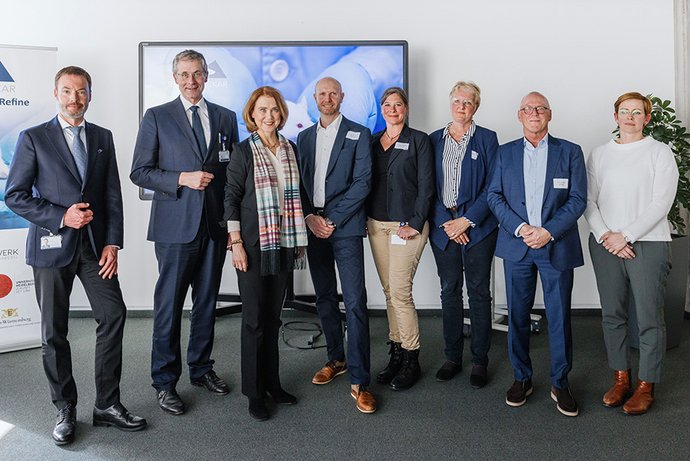The 3R Center Rhine-Neckar, established in 2021, is committed to animal welfare in research. Funding from the Baden-Württemberg Ministry of Science, Research and the Arts is now being made permanent. An occasion for Minister Petra Olschowski to visit the Central Institute of Mental Health (CIMH) in Mannheim. The CIMH coordinates the 3R Center Rhine-Neckar; the other partners are the Mannheim University Medical Center and the University of Heidelberg. Together, they want to reduce the number of animal experiments, reduce the stress on laboratory animals and ensure high data quality.
The internationally recognized 3Rs principle (Replace, Reduce, Refine) describes principles for research involving animals. First, animal experiments should be replaced by suitable alternatives wherever possible (Replace). Second, if this is not possible, the number of animal experiments should be reduced to the lowest possible level (Reduce). Third, by optimizing scientific methods and measurement procedures, carefully selecting animal models and keeping them in a species-appropriate manner, the conditions for laboratory animals should be improved as much as possible (Refine).
More animal welfare and better research go hand in hand
In Baden-Württemberg and the Rhine-Neckar region, there are numerous biomedical research institutions where animal experiments are carried out. Animal welfare plays an important role here. The 3R Center Rhine-Neckar supports scientists in applying the 3R principle in their research projects. The establishment of the 3R Center Rhine-Neckar under the direction of the CIMH three years ago was funded by the Baden-Württemberg Ministry of Science, Research and the Arts. As a result of an interim evaluation of the 3R initiative carried out in 2023, the state will make the Rhine-Neckar 3R Center permanent from 2025. This was announced by Baden-Württemberg's Minister of Science, Petra Olschowski, during her visit to the CIMH to find out about current developments.
"The 3R Network makes a key contribution to improving animal welfare in research and teaching. More animal welfare and better research are not opposites – far from it: the activities of the 3R network show that both belong together," says Science Minister Petra Olschowski. "With our 3R network Baden-Württemberg, we want to actively contribute to advancing the development and application of alternative and complementary methods to animal experiments and to improve the necessary animal experiments in Baden-Württemberg research and ensure the best possible protection of laboratory animals," said Minister Olschowski. "In order to better understand the complexity of the brain in healthy people and mentally ill patients, animal experiments are still indispensable. We are also working hard on alternative methods, such as stem cells, which are already providing valuable results. However, it will be decades, if ever, before we can dispense with animal testing," says Prof. Dr. Andreas Meyer-Lindenberg, Head of the Executive Board of the CIMH.
A quality system for good research practice and solid data
During the visit, the three network partners provided insights into their animal research and presented measures to improve animal welfare in necessary animal experiments. The 3R Center Rhine-Neckar is an important contact point for researchers to develop the design of new experiments, exchange expertise and attend training courses on the 3R principles. One focus of the work is the implementation of research with a view to good research practice and solid data. To this end, the existing 3R principles are being expanded to 6Rs. The three additional principles are registration, robustness and reporting. "The original 3Rs do not cover all aspects of animal welfare according to the current status. That is why we are implementing systematic approaches that go beyond this and building a quality system for research data," says Dr. Marcus Meinhardt, coordinator of the 3R Center Rhine-Neckar and scientist at the Institute for Psychopharmacology at the CIMH.
The preclinical quality system EQIPD (Enhancing Quality In Preclinical Data) improves the validity of our research results and leads to improved transferability to humans. In addition, newer methods for data integrity, study design and standardization of processes are being established. "Several working groups at the CIMH that conduct animal research are already aiming for EQIPD certification in order to lead the way as flagship projects. Together with our partners, we want to ensure that other research institutions in Baden-Württemberg and beyond join this quality system," says Prof. Dr. Rainer Spanagel, Scientific Director of the Institute for Psychopharmacology at the CIMH and one of the initiators of the 3R Center Rhine-Neckar.
Obtaining data using alternative approaches
In order to further reduce animal testing, the 3R Center also supports research projects that obtain data using alternative approaches. These include, for example, laboratory tests on cell systems and organoids (in vitro approaches) as well as experiments using computer models and simulations or by retrieving data already collected from special databases (in silico approaches). Such big data approaches hold great potential for animal welfare in research in the field of preclinical neuroscience.
The Central Institute of Mental Health, the Interfaculty Biomedical Research Facility (IBF) at the University of Heidelberg and the Mannheim University Medical Center are involved in the 3R Center Rhine-Neckar.


